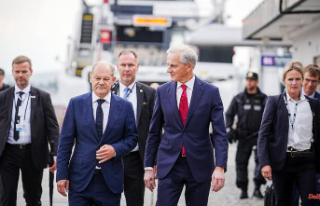So far, only people from the political and economic leadership of Russia have been banned from entering the EU. During Scholz' trip to Scandinavia, there was disagreement as to whether that was enough or whether all citizens should be punished for the Russian war of aggression.
Despite the skepticism of Chancellor Olaf Scholz, Finland is pushing for an EU entry ban for Russian tourists. "Russian citizens did not start the war, but at the same time we have to be clear that they support the war," said Finnish Prime Minister Sanna Marin at a summit meeting of the heads of government of the five Nordic countries with Scholz in Oslo.
"I don't think it's right that Russian citizens can enter the EU, the Schengen area and go sightseeing as tourists while Russia is killing people in Ukraine." Marin received support from her Danish colleague Mette Frederiksen. Scholz, on the other hand, stuck to his rejection of a general entry ban and referred, among other things, to Russian citizens who are fleeing Putin's regime. "All the decisions we make should not make it more complicated for them to seek freedom and leave the country to escape the dictatorship in Russia," he said. "It's not the war of the Russian people, it's Putin's war."
So far, people from the political and economic leadership of Russia have been banned from entering the EU. In addition to Marin, the Estonian Prime Minister Kaja Kallas also spoke out in favor of an extension last week. In Oslo, Marin called for a discussion about this in the European Council. Frederiksen expressed understanding for the position. "I find it understandable that some Europeans and perhaps especially some Ukrainians find it a bit strange that Russia has attacked a European country and at the same time we are receiving tourists from this country that has attacked another country," said the social democrat. "I think we should discuss that."
Swedish Prime Minister Magdalena Andersson advocated joint EU action on this issue, but neither did Norway's Prime Minister Jonas Gahr Støre.
Following the deliberations in a large group, Scholz looked at the famous paintings "The Scream" and "Madonna" by the Norwegian painter Edvard Munch together with the Norwegian Prime Minister Jonas Gahr Støre and drove with him on an electrically powered passenger ship through the Oslofjord. The trip to Oslo was also his first visit to Norway. Iceland's Prime Minister Katrin Jakobsdottir also attended the Nordic countries' summit.
The federal government has been trying for months to establish a closer partnership with the Nordic countries in the energy sector in order to get rid of Russian gas imports. Norway has been Germany's most important gas supplier since Russian gas supplies were cut back drastically in mid-June.
Federal Economics Minister Robert Habeck was in Oslo in mid-March, just a few weeks after the start of the Ukraine war, to intensify energy cooperation. It was also about the possible construction of a pipeline for the transport of hydrogen from Norway to Germany. Scholz also advocated a significant strengthening of cooperation in the energy sector. "We all face the same challenges," he said. Therefore, the forces must also be bundled.
In the evening, the Chancellor wanted to travel on to Sweden, where he will meet Prime Minister Magdalena Andersson on Tuesday morning for a one-on-one meeting. A visit to the truck manufacturer Scania is then planned, which is working together with Volkswagen on concepts for the electrification of truck traffic.
The visit to Stockholm in particular will also deal with the expansion of NATO. Finland and Sweden want to join the western defense alliance. 23 out of 30 member states have already agreed, including Germany. Among others, however, Turkey is still missing, which had blocked the admission process for a long time and tied its approval to conditions.












